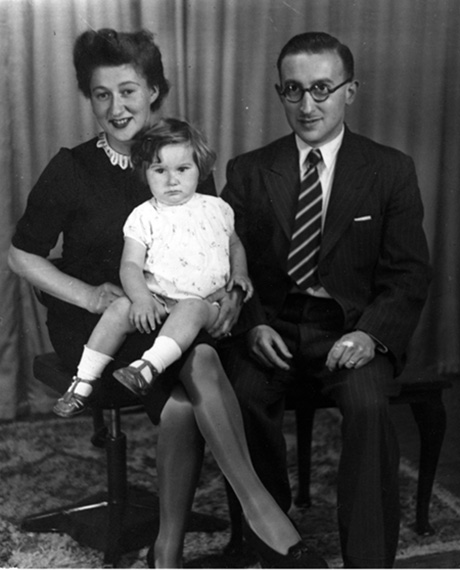Click HERE [2] to go to the cemetery entry.

Kurt and Elfrieda with their first child, Evi
Kurt Munzer
Kurt was born in Beuthen, Upper Silesia, in August 1908. His family were shop-keepers. He and his older sister attended a Jewish primary school and then Kurt went on to the Gymnasium (secondary school). While there, he took extra English lessons and decided that one day he would go to England. He left school at 16 and joined the local bank as a junior clerk. However, there was a lot of unrest in Upper Silesia between Germany and the new state of Poland, so he moved west to Munster, a town in Westphalia near the Dutch border, and worked as an accountant in a grain business. With the rise of the Nazis to power, life became more difficult. There were boycotts of Jewish shops, mobs gathering outside the homes of Jewish families, news of concentration camps being established, and so in December 1935 he decided to leave. He taped all his money to the underside of his car, and crossed the border to Enschede in Holland claiming political asylum.
Elfrieda Goetz
Elfrieda was born in Hohenstein, sixty miles south-east of Danzig in East Prussia, in January 1920. Her father, who had served in the German army on the Russian front, died six months previously. Her family had lived in Germany for three generations and moved to East Prussia around 1900. They had a grain import-export business. As soon as the Nazis took power in 1933, she was separated from the other children in her Gymnasium and they were forbidden to speak to her. She left school and was tutored privately at home but the boycott of Jewish shops ruined the family business. They moved to Berlin in 1936, and then, in February 1938, they moved to Holland where her step-father had three brothers. She met Kurt on her first day in Enschede. They married in Enschede Synagogue in April 1939 and moved to the Hague.
A Daring Escape
On 10 May, 1940, German troops invaded Holland, and four days later the Dutch military forces surrendered. Elfrieda, by now four months pregnant, became hysterical. They had to leave, but how? They drove to the port of Schevening that evening, and looked for a fishing boat. Instead they found three students who said they were going to take the port`s lifeboat out to sea after dark. They both got on board and 46 refugees left at 9 pm. This was the only boat to leave Holland during the war. They were picked up by a British destroyer the following afternoon and taken to Dover, and then to London where they were imprisoned, Kurt in Pentonville and Elfrieda in Holloway. After a week, Kurt was moved to Onchan, on the Isle of Man. Two weeks later Elfrieda was moved to a women`s camp also on the Isle of Man. The couple`s first daughter, Grace Evelyn, was born there in October 1939.
Coming to Leicester
A year later, they were reunited in a mixed camp, and there they met a boyhood friend of Kurt`s from Beuthen, Fredi Silberberg, with his wife Gerta. The Silberbergs had already settled in Leicester before the war, and when they were released, they returned to Leicester and found Kurt a job doing war work, grinding lenses in a factory. So Kurt and Elfrieda were able to leave the Isle of Man and go to Leicester, where, after a very difficult few years, they made their home. A second daughter, Ruth, was born in Leicester in 1943. Both Kurt and Elfrieda lost all their relatives in concentration camps, except for the two sons of Kurt`s sister, who came to England on the Kindertransport in 1938. Kurt started work again as an accountant; Elfrieda got a job at a photographer`s, and in 1947 they were both naturalised. Kurt lived to celebrate his 100th birthday; Elfrieda died in 1996 aged 76.